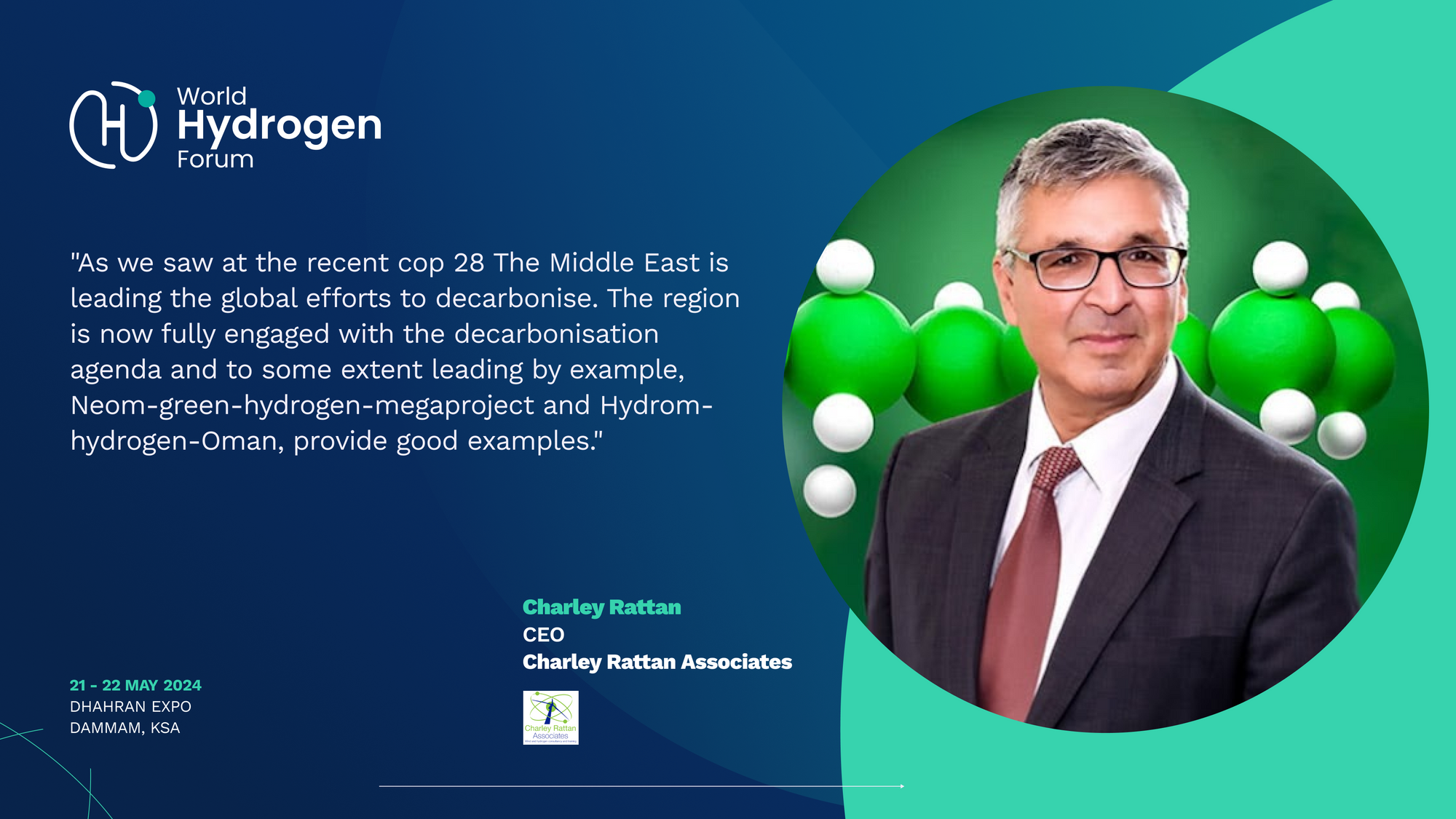Delighted to present a Q&A Session with Charley Rattan, the luminary at the helm of Charley Rattan Associates—a global powerhouse in energy transition training and advisory services. As the CEO, Charley brings over 25 years of real-world renewable experience and a proven record of successfully delivering major projects for esteemed companies like SSE, EON, and Shell. A distinguished faculty member of 'World Hydrogen Leaders,' Charley specialises in Offshore Wind, Floating Wind, Hydrogen, P2X, and Carbon Capture technologies. Join us in exploring the profound insights of this award-winning hydrogen expert as he navigates the complex landscape of the energy transition.
#WHF: What potential do you see for the Middle East to become a key player in the global hydrogen industry, considering its resources and strategic positioning?
#Charley Rattan: There is great potential for the Middle East to take a lead on a global basis in the hydrogen sector. It's not just me saying this, it's the financial sector we've seen project mele already into construction in Saudi Arabia and Hydrom strategic underpinnings in nearby Oman.
Given the nature of the Middle East, especially the Suez Canal - where the impacts of delays are felt worldwide - and with projects starting to emerge in Egypt and elsewhere. The Middle East is becoming a key player in the global hydrogen economy.
#WHF: How might partnerships between Middle Eastern nations and international stakeholders accelerate the development and adoption of hydrogen technology in the region?
#Charley Rattan: Partnerships between international stakeholders and the Middle East are already in place and offer a basis on which to further expand. We have oil and gas majors such as Shell BP and others with a significant resource in developing both on and offshore. Interestingly, the renewable sector brings real strengths regarding stakeholder management, environment, managing environmental concerns, and making sure that projects are done to the best possible standards. They are starting to appear in the Middle East with companies such as Siemens and others. Much of this will depend on the blue or green split, the blue infrastructure might need amending on refineries and ports, the green infrastructure much of it coming from German electrical expertise and to the UK and Norway.
Contracts have been led to giving a good basis on which to build Well the Middle East already has energy storage facilities, it's already got distribution ports. Standards are still emerging. A recent study on ammonia for example, has emerged from the Netherlands which has stringent environmental stuff standards on might form a useful baseline going forward is worth considering standards, merging all the time. standards will need to be global ultimately to be worthwhile.
#WHF: In your opinion, what role can the Middle East play in setting global standards and best practices for the production, storage, and distribution of hydrogen within the renewable energy landscape?
#Charley Rattan: The Middle East brings oil and gas expertise. The use of dealing with the heat and so forth is also useful, but it needs to be aligned with those developing standards on a global basis as well. So nowadays, the Middle East who were to stay engaged with those emerging energy landscapes forever As we saw at the recent cop 28 The Middle East is leading the global efforts to decarbonise. The region is now fully engaged with the decarbonisation agenda and to some extent leading by example, Neom-green-hydrogen-megaproject and Hydrom-hydrogen-oman, provide good examples.
#WHF: How critical is the development of hydrogen infrastructure in the Middle East, and what steps do you believe are necessary to establish a robust hydrogen ecosystem in this region?
#Charley Rattan: If the energy transition is to succeed on a global basis, then we need continuing engagement and the leadership in the Middle East is critical. The expertise that we've got in dealing with the energy contracts, the background logistics, the realities of major projects management to time to budget with a safety culture is important.
Similar lessons need to be transferred to the hydrogen ecosystem, with the offtake might be one area to give leadership and perhaps they're decarbonising oil and gas which is occurring, and the infrastructure for high level offtake such as transport and the decarbonisation of industrial clusters, steel, iron, cement all play a part in a developing economy.
#WHF: How do you perceive events like the World Hydrogen Forum contributing to the advancement and collaboration within the hydrogen industry, particularly concerning the Middle East's involvement and global partnerships?
#Charley Rattan: The World Hydrogen Forum enables academics, developers, stakeholders and global finance to get together and troubleshoot and liaise in advance of leasing rounds.
It's always good to engage face to face to ensure that they're speaking from the same hymn book for want of a better phrase, that their thoughts are aligned and creating the global partnerships that are indeed necessary to bring forward the nascent hydrogen sector.
The event will maintain MENA momentum following Cop 28 where sometimes unlikely drivers of the green economy who would have thought, for example, that Saudi Arabia would now be at the very forefront of the green hydrogen economy, but that's the reality of it. The World Hydrogen Forum is a good example of this in action and very important indeed.

